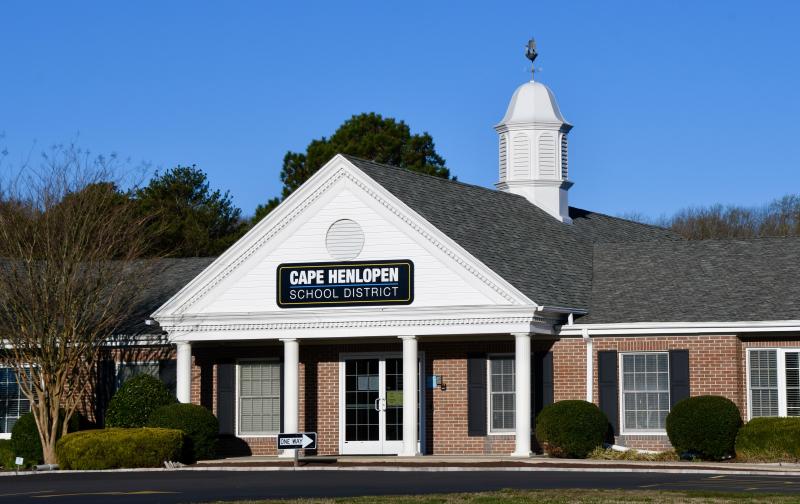Cape board president: Goal to keep one high school in district
Cape district officials voted to approve a revised referendum request at an April 11 school board meeting, where leaders responded to audience questions about finances, land options and education standards.
Superintendent Bob Fulton said he was very disappointed the March referendum failed.
“The last referendum obviously was a setback for us but nothing that we can’t overcome,” he said, noting Cape is the top-performing district in the state.
A lot has changed in the district since the last referendum six years ago, he said, and district leaders need to do a better job communicating needs to the community and building relationships.
“Because one thing I’ll never stop doing is fighting for our kids,” he said. “I don’t want just an OK education for our kids; I want the very best for our kids, and I’ll fight for that till I leave here.”
The best path forward would be to proceed with a Tuesday, May 21 referendum with changes, he said, mostly involving elimination of the previously requested pool facility and a slightly lower ask for current expenses.
The revised referendum seeks a $0.086 increase to the debt service tax rate to purchase a $15 million, 102-acre property on Cedar Grove Road upon which to build a $21 million district office and a $6 million transportation maintenance facility. With the district office and maintenance facility moved off the high school grounds, the plan calls for the expansion of Cape High, which currently has more than 2,000 students.
For these improvements, the average homeowner would pay $24.09 per year, or $2.01 per month, for the first year. In subsequent years, the rate would decrease.
The referendum also calls for a $0.305 increase to the current expense tax rate that will generate almost $4.6 million annually in revenue for needs such as salaries, utilities, technology and instructional materials. This increase will cost the average taxpayer $85 per year, or $7 per month.
Together, the impact on the average taxpayer would be $110 per year, or $9 per month. Fulton said he calculated the average taxpayer’s costs based on the assessed value of homes currently selling in the $450,000 to $500,000 range. The assessed value is not the same as the appraised value.
Fulton said he still believes a pool that all students will have access to is very important. After the referendum, he said he will gather community groups to talk about how to get that accomplished for students.
“We have a lot of families here that have a lot of things, and we have a lot of families here that don’t have anything,” Fulton said. “We have kids in our district who have never been to the ocean, believe it or not. We have kids who don’t have running water in their homes. I feel an obligation that we do the very best we can for all kids to level the playing field, and I thought everything we were doing with the last referendum was going to help with some of that and give kids an opportunity, who never would have had an opportunity, to learn to swim or be on a swim team.”
With no pool, $0.03 can be reduced from the operating expense ask, he said, and 90% of the total ask would be for current expenses to go toward safety and security, staffing, technology and energy costs.
The request is reasonable, he said, as the district hasn’t gone to referendum for six years and still has the second-lowest tax rate of county schools. Home values have doubled in the past couple years, he said, while the district’s tax rate has only increased 35% in 18 years.
“So we aren’t about raising taxes just because we can or we want to; we do it when we need to, and that proves the fact,” he said.
School board members expressed disappointment over the failed referendum, but thanked community members for voting and said they want to establish better lines of communication with area residents.
Board Vice President Julie Derrick said she viewed the pool as an equity decision, because not everyone has one in their yard or neighborhood. The amount of misinformation swirling around the referendum was overwhelming, she said.
Janis Hanwell said Cape is the only district in the state that started the school year with all positions filled. Other districts did not because they cannot afford to pay the local share, she said. If the district waits until fall to hold a referendum, it wouldn’t see the funding for another year, she said, so it needs to be implemented in July when the fiscal year begins.
The state allows districts to go to referendum twice in a calendar year, Fulton said.
During public comment, many speakers offered other locations for school facilities and provided alternating feelings about the pool on the previous referendum.
Some audience members said the ballot should contain two questions so voters have a choice. Another queried why the district wanted to place multiple facilities on the proposed property.
One man suggested building a smaller pool attached to a school; another said the district has no sympathy for him because he’s already suffering from high food and fuel costs along with the price of parking in Rehoboth. One man suggested partnering with a business to build a pool and rent the space.
Another man said he supported a pool but didn't think it should be the Taj Mahal; he said the cost per square foot was excessive.
The standard of education needs to be improved, one man said, noting that Cape is not great compared to the rest of the country. The district should keep residents more informed, another said.
Noting the economy and the ongoing assessment, another man said the referendum’s timing was bad and a 10-year plan for schools is needed.
A woman said the thought that kids don’t have access to a pool or the beach makes her sad. Swim meets at the YMCA are chaotic, she said, so a pool would have been a huge benefit.
Once the audience comments concluded, Myers and Fulton responded to each one. Myers said she thought one question would be the simplest way to ask voters for the increases. Fulton said he thought because the current expense was the bigger portion of the request, the pool, at just $1 to $3 per month depending on the property owner, was a reasonable ask.
Regarding facilities and land use, Myers said the district goes through the state PLUS process, in which parcels of land are identified and approved for the district to explore purchase negotiations with property owners.
That process identified 16 property owners with eligible land on which to build school facilities, she said. The district contacted all property owners, which were scattered through the Milton and Route 9 area, she said, and only one property owner was willing to negotiate.
The district originally asked for 59 acres, thinking that was adequate, she said. When the state did not approve the portion of the referendum it would chip in for, she said district leaders regrouped and considered going back to the state with a certificate of need in another year.
However, due to inflation and the rising cost of land, the financially prudent move was to purchase more land so property is in hand for another school in the future, she said. Fulton noted that the average taxpayer will pay $5 per year for the 102 acres, compared to $3 per year for the 59 acres.
Myers then countered the thought that the proposed facilities don’t help district kids. The high school has more than 2,000 students, she said, noting her own children pack lunch because they can’t get through the cafeteria line quickly enough to eat. The high school addition is full, and there is no adjacent land to purchase, she said.
“We are looking to do anything we possibly can do to continue to have one high school in our school district,” she said. “I really feel strongly that when you add a second high school to a district, it creates a rivalry in the same school district, and in the end, we’re all Cape. I want all of us to be all Cape. I want to avoid that second high school for as long as we possibly can.”
To add onto Cape High, more stormwater management area and parking are needed, she said, and to do that, something has to go, and she doesn’t want it to be athletic or JROTC practice fields. The only thing that can go is the district office, she said, which will provide a significant piece of land on which to shift stormwater and parking, or a possible building.
Board member Jessica Tyndall, who represents the Milton area, said she was the first one to ask if the facilities could be built in Milton. But no landowners were willing to sell land, she said.
Fulton said he expected a different reaction to the proposed land purchase on Cedar Grove, because if it’s not school facilities on the site, it will be 300 homes. The district office has more than 80 staff members split in two different buildings, he said.
The district would be undergoing a standard state construction project, he said, noting the average taxpayer would pay $7 per year for the district office. Fulton said he’s lived in the Cape Region for 33 years, and home values have gone up a lot while the taxes have gone up a little, and Cape still has the second-lowest tax rate of county schools.
“We’re coming to you now because we’re in desperate need of actually just hiring people we qualify for,” Fulton said.
The ongoing county property reassessment presents unknowns, Myers said, but what is known is that it is meant to be revenue-neutral, meaning that no matter what value is given to a home, the taxes paid should not change very much.
A clause does allow school boards to vote for a one-time increase of up to 10% to make up for any losses, she said.
“We are mindful of the trust you give us in this situation, and it’s why we never take liberty with your tax dollars, why we go out to referendum and ask for increases, why we make every effort every year to lower taxes when possible, and that any increase, any use of that 10%, would be to get us to revenue neutral,” Myers said. She explained that it would not be for the district to make as much money as it can. “That’s important to us. The trust that our community has in us is important, and we feel like abusing that by taking a full 10%, or more than we need, is a violation of that trust.”
The district will have to lower the tax rate a lot so it doesn't collect more money than the previous year when reassessment is complete, Fulton said. The district also can’t control the timing of the ask, he said, noting there is never a good time. A 2020 referendum was canceled because it wasn’t a good time, he said, and if the district had followed through then, it wouldn't have to ask for an increase in the current expense tax rate.
Myers said district leaders are currently working on a long-range facilities plan that may be a 10- or 20-year plan when completed.
Regarding a plan for improving education, she said each school has an improvement plan.
“We do that every day. It’s why we exist,” she said. “The focus is always on the improvement of our students and our district.”
The referendum is set for Tuesday, May 21. Polls will be open from 7 a.m. to 8 p.m. at Cape High, Mariner Middle, Beacon Middle, Rehoboth Elementary and Lewes Public Library. In addition to two new voting locations, more machines will be in use in response to the long lines from the last election, Fulton said.






















































